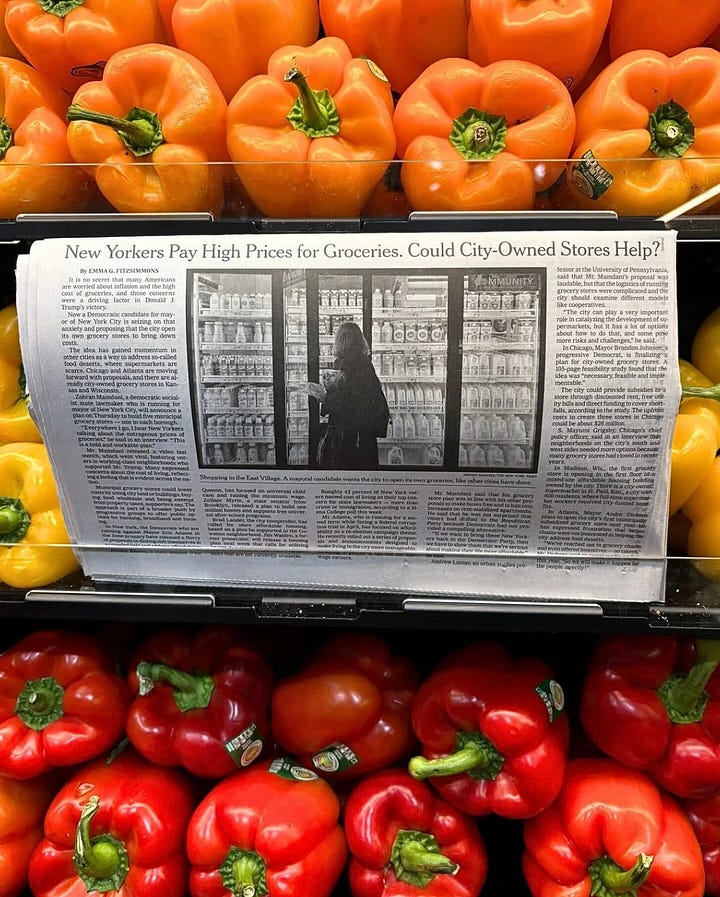Could publicly-owned grocery stores break Canada’s grocery oligopoly?
A bold proposal from New York’s Zohran Mamdani is sparking interest north of the border. Experts say a Canadian public option is not only possible — it’s long overdue


This story was originally published in Ricochet.
In New York City, Democratic mayoral nominee Zohran Mamdani shocked the world in June with his landslide primary victory over former state governor Andrew Cuomo with a campaign that notably included a very popular pledge to open a city-run grocery store in each of the city’s five boroughs.
Mamdani’s proposal was intended to deal with the phenomenon of food deserts, where grocery stores are scarce and food prices tend to be higher than usual, a concept that will be all too familiar to residents of Canada’s north and the Maritimes.
Could something along the lines of Mamdani’s proposal work in Canada to loosen the grip of its grocery oligopoly, and ensure all Canadians have access to affordable, nutritious food wherever they live?
Food prices in Canada continue to increase while Canada’s largest grocery chains continue to increase their profit margins by double digits.
According to the most recent food inflation report from Loblaw, one of Canada’s big five grocers, April’s food inflation rate of 3.8 per cent “continued to outpace” increases to the broader consumer price index.
In the first quarter of 2025, Loblaw shareholders made $503 million in profit, representing a 9.6 per cent increase from the same period a year earlier. From mid-December 2024 to mid-March 2025, Metro reported profits of $220 million, a 17.6 per cent increase from the previous year. Empire, which owns Sobeys and Safeway, reported $173 million in profitfrom February through April, a 16.1 per cent increase from the previous year.
A significant portion of these earnings are going into the pockets of executives, so much that some can afford to live in a castle.
Loblaw CEO Per Bank made $11.63 million in 2024 — a decrease from the $22.1 million he took home in 2023, his first year on the job. Eric La Flèche, CEO of Metro, was paid $5.4 million in 2023. Empire CEO Michael Medline made $7.95 million in 2024, up from $6.8 million the previous year.
The Canadian government, meanwhile, shows no willingness to use its weight to force down grocery prices, or attempt to provide Canadians with a public non-profit option. Instead the government is attempting to lure yet another international grocery chain to join Walmart and Costco in the Canadian market.
Public policy entrepreneur and author Vass Bednar penned an article in the Perspectives Journal last month arguing that Mamdani’s proposal for publicly owned grocery stores “reflects a hunger for real alternatives to corporate profits amid high prices.”
While this proposal might appear “weird or radical,” Bednar noted that governments “already operate city-owned systems to deliver essential services: clean water, public transit (to mixed results when they depend on other levels of government to fund), electricity, and garbage collection (in most cities).”
“A municipally-run grocery wouldn’t eliminate competition; it would expand it.”
This isn’t, however, about replacing established grocers with a state-run monopoly. It’s about experimenting with different business models to benefit consumers.
“A municipally-run grocery wouldn’t eliminate competition; it would expand it,” she wrote, pointing to Saskatchewan’s publicly owned telecom company SaskTel, which has led to Saskatchewan consistently having some of the lowest telecoms rates in Canada.
In an interview, Bednar told Ricochet that the point of a municipal grocery store isn’t necessarily “to compete directly head-on with Loblaw,” but to use the “role of the state in supplementing where there’s a market failure.”
It wouldn’t be a “silver bullet,” she cautioned in her Perspectives article, but could be one tool of many to address food accessibility.
These might include price freezes on “core essential goods,” establishing product categories in which the government mandates that grocers provide at least one low-cost option, as was done in France and Greece, and introducing windfall taxes on excess profits that could be returned to consumers to help them pay for groceries.
Keldon Bester, executive director of the Canada Anti-Monopoly Project, told Ricochet that the amount of competition in the grocery sector “determines how much a business must eat versus pass onto consumers.”
“In Canada, because of a lack of competition, grocery chains were able to fully pass on cost increases to customers, keeping their margins stable and earning higher dollar profits over a now larger cost base,” he explained in an email.
In 2023, the Competition Bureau conducted a study into Canada’s grocery market, which concluded plainly that “Canada needs more grocery competition,” and that all levels of government “need to take steps to encourage and support” that outcome.
It recommended the federal government implement a Grocery Innovation Strategy that would promote “the emergence of new types of grocery businesses and expanding consumer choice.”
The report also called on governments to “implement policies that support the growth of independents, as well as the entry of international and discount grocers.”
It didn’t call for a public option, nor did it explicitly rule one out.
Stuart Trew, a researcher with the Canadian Centre for Policy Alternatives, told Ricochet that it would be easy for the Canadian government to create a Crown corporation to compete with established grocers.
“It’s got to have some kind of charter in law, and some kind of rules that are established in law. The relationship with the government would be established in law, and it would have some kind of mandate established in statute, and then it operates under those terms,” he explained. “It would just be as simple as that.”
The question is what shape the Crown corporation would take, Trew cautioned.
“We have a right under the trade agreements to establish new state-owned companies,” he explained. “It just gets murky after that as to how much support we give them in what areas, whether you can do it in areas where they’re competing with the private sector.”
Under the Canada-U.S.-Mexico Agreement (CUSMA) and Trans Pacific Partnership (TPP), for instance, signatories are prohibited from providing assistance, such as grants, debt forgiveness or loans on more favourable terms than are available commercially, that causes “adverse effects” to companies from another country that’s party to the agreement.
“All of this would of course annoy Canadian grocery chains, but I don’t think they would have a trade-based case against public or state-owned grocery stores. They’d just have to live with it.”
Provincially-owned companies, which are exempt from these requirements, have more flexibility under the Canadian Free Trade Agreement, which requires that they act “solely in accordance with commercial considerations… except to fulfill” their specific mandates.
“All of this would of course annoy Canadian grocery chains, but I don’t think they would have a trade-based case against public or state-owned grocery stores,” Trew added in a follow-up email. “They’d just have to live with it.”
A state-owned grocery chain’s structure, whether it’s operated for-profit or as a non-profit, would have an impact on its efficacy in terms of lowering grocery prices, Trew cautioned.
“If it was structured as a profit-seeking entity, just like Loblaw or Amazon, then we might not see as big gains. But if it didn’t have those pressures to deliver like a three per cent profit, then of course there’d be savings across the board,” Trew said.
Scale also matters, he added, pointing to the Liquor Control Board of Ontario — the state-run liquor store that is able to purchase alcohol in bulk.
“The biggest booze purchaser in the world has some power over the prices it takes from suppliers, just like Walmart does in the States. It could have quite a beneficial effect on prices,” said Trew.
“You could give it that mandate that it has to keep prices low.”
Bester of the Canadian Anti-Monopology Project agrees that a state-owned grocer is possible, but he sees the government’s role more as “breaking up concentrated power and barriers to competition throughout the supply chain – as opposed to creating a grocery competitor.”
Another option Trew pointed to is for governments to support the growth of non-profit food co-ops, which are owned and governed by their members.
Bester agrees that co-ops “should be part of a diverse food system.”
He said something like the Ontario Food Terminal in Etobicoke, which provides a venue for regional farmers and independent retailers to buy and sell wholesale produce at competitive prices, could provide the type of infrastructure necessary for co-ops to scale up.
“Support for co-ops at the wholesale and distribution level would be a great step to add competition, particularly for remote communities in Canada,” said Bester.
In November 2024, then-NDP MP Alistair MacGregor introduced a proposed National Food Cooperative Strategy Act.
The private member’s bill didn’t make it past its first reading, and MacGregor was defeated in the ensuing election by Conservative Jeff Kibble.
The federal government doesn’t appear to think food inflation is a serious enough issue in Canada to warrant a significant break with existing policy.
In a statement to Ricochet, Department of Finance spokesperson Benoit Mayrand said that at its peak of 10.6 per cent in January 2023, food inflation in Canada was the “second lowest in the G7 next to Japan.” Canada’s average food inflation rate of 2.1 per cent in the first five months of 2025, Mayrand added, is also the second-lowest in the G7.
“The Government of Canada is committed to a policy of low, stable and predictable total inflation,” he said, pointing to a series of measures the government has taken to reduce the impacts of inflation.
These include decreasing the lowest income tax bracket to 14 per cent from 15 per cent, launching the $200-million-a-year National School Food Program, establishing a voluntary Grocery Code of Conduct, which is intended to govern relations between grocers and suppliers but has yet to go into effect, and creating a Food Price Data Hub for consumers to track prices.
None of these measures will address the circumstances that enabled multi-millionaire grocery executives to collude to fix bread prices, engage in union busting, or take away pandemic “hero pay” after three months.
That would require the government to have the will to do what Bester says are the “things that only it can do,” and help level the playing field for different types of competition.
Bednar praised the National School Food Program for its universality, which she predicted will destigmatize students whose parents cannot afford to provide them with a nutritious lunch every day.
“Kids need healthy food at school every day, and the more we can do to solve those gaps, fantastic,” she said, adding that these are the sort of direct state interventions that could make a significant difference.
The Grocery Code of Conduct, by contrast, “doesn’t have teeth,” Bednar said.
“Instead of pursuing harmonized or federal legislation with teeth, we stayed in our comfort zone and took our sweet time while consumers stretched their food budget,” states a Globe and Mail op-ed she co-authored with economist Denise Hearn last year.
“We are a country that’s become too accustomed to settling for scraps.”


In the meantime, in Edmonton we have a nutritious food buying club through the Wecan Food Basket Society. Many years ago in Brandon, Manitoba, we ran a little food coop store. We can build alternatives, without waiting for government.
For sure it would be a good idea.......but could a publicly owned grocery store avail itself of the same supply chains the big monopolies use??? And wouldn't it evoke the dreaded 'socialism' that so many progressive folk work hard to distance themselves from???
We should know by now, that anything other than deregulated capitalism, where the 'free market' decides what 'enslaved people' get to have.......is evil. Many have drunk that koolaid, and as yet, I fear there is no easy antidote.